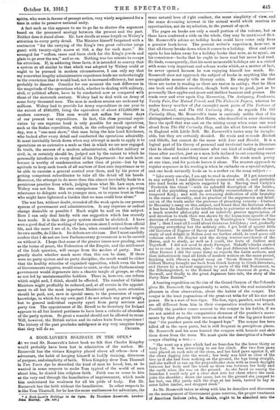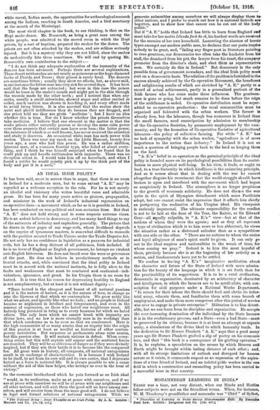A BOOK-LOVER'S HOLIDAYS IN THE OPEN.* As we read Mr.
Roosevelt's latest book we felt that Charles Kingsley would probably have been lost in admiration of the author. Mr. Roosevelt has the virtues Kingsley placed above all others—love cf adventure, the habit of keeping himself in Lodlly training, directness of purpose, and simplicity of faith. When Kingsley drew Tom Thurnall In Two Years Ago he described the kind of man he loved, but, as he wanted in some respeots to make Tom typical of the world of men about him, he denied him religions faith. Faith was to come to him at the very end through the humiliation of imprisonment, which made him understand his weakness for all his pride of body. But Mr. Roosevelt has the faith without the humiliation. In other respects he is like Tom Thurman, for he has the same restlessness for adventure, the • A BooL-Luvo's Rolidays is as Opai. By Theodore Roosevelt. Landon: John Murray. Os. net.]
same natural love of ight conduct, the Barna simplicity of view, and the same devouring interest in the animal world which receives its opportunities, not its rerudiation, in the pursuit of sport.
The pages on books are only a small portion of the volume, but as these have conferred a title on the whole, they may be mentioned first.
Mr. Roosevelt's advice on holiday books could have come only from a genuine book-lover. The present writer's experience, however, is that all theory breaks down when it comes to a holiday. Over and over again he has taken away for a holiday books that were, so to speak, on his conscience—books that he ought to have read but never had read. He finds, consequently, that his most memorable holidays are a:scciated with some very important and solemn works which, as a matter of fact, he never opened because he was enjoying himself too much. /dr.
Roosevelt does not approach the subject of books in anything like the
recognizable manner of the literary critic. He simply tells us that there are tastes in reading as there are tastes in eating ; that he likes one book and dislikes another, though both may be good, just as he personally likes apples and pears and dislikes bananas and prunes. He reads over and over again Guy Mannering, The Antiquary, Pendennis, Vanity Fair, Our Mutual Friend, and The Pickwick Papers, whereas he makes heavy weather of (for example) most parts of The Fortunes of Nigel, Esmond, and The Old Curiosity Shop. As regards The Old Curiosity Shop, Mr. Roosevelt's taste is curiously unlike that of his distinguished countryman, Bret Harts, who described in seine charming lines the spell that was cast on the mining camp when sonic one read aloud from The Old Curiosity Shop, and the silent listeners wandered in England with Little NolL Mr. Roosevelt's tastes may be inexplic- able, but they are certainly decided. Ho reads and re.reads acbeth and Othello, but cannot do the same with Lear and Hamlet. It is a logical part of his theory of personal and irrational tastes in literature
that he should hanker sometimes after one kind of reading and some- times after another, just as a man feels inclined to eat something sweet at one time and something sour at another. Ho reads much poetry at ono time, and for periods leaves it alone. The nearest approach to regular sequence in his reading is when he embarks on a special subject, and one book naturally leads on to a neither cn the vamp subject :—
"Like every one e!se, I am apt to road in streaks. If I get interested in any subject I read different books connected with it, and probably also read books on subjects suggested by it. Having road Carlyle Frederick the Groat '—with its splendid description of the battles, and of the unyielding courage and thrifty resourcefulness of the iron. tempered King ; and with its screaming deification of able brutality in the name of morality, and its practise of the suppression and falaiti- eat'on of the truth under the pretense of preaching voracity—I turned to Macaulay's essay on this subject, and found that tho historian whom it has been the fashion of the intellectuals to patronize or deride showed a much sounder philosophy and an infinitely greater appreciation of and devotion to truth than was shown by the loquacious apostle of the doctrine of reticence. Then. I took up Waddington's Guerre do Sept Ans ' ; then I road all I could about Gustavus Adolphus ; and, gradually dropping everything but tho military side, I got hold of quaint little old histories of Eugene of Savoy and Turenno. In similar fashion my study of and delight in Mahan sent me further afield, to road queer old volumes about Do Ruytor and the daring warrior-merchants of the Hansa, and to study, as well as I could, the feats of Suffron and Togothoff. I did not need to study Farragut. Mahaffy's books started mo to re-road—in translation, alas !—the post-Athenian Greek authors. After Ferrero I did the same thing as regards the Latin authors, and then industriously road all kinds of modern writers on the same period, finishing with Oman's capital essay on 'Seven Roman Statesmen.' Gilbert Murray brought me back from Greek history to Crook literature, and thence by a natural suggestion to parts of the Old Testament, to tho Nibelungenlied, to the Roland lay and the chansons de guides, to Beowulf, and finally to the great Japanese hero-tale, the story of the Forty-Nine Rouble."
A hunting expedition on the rim of the Grand Canyon of the Colorado gives Mr. Roosevelt the opportunity to write, with the real naturalist's pleasure in close observation, about the habits of the cougar. The
cougar is the least pugnacious of the great-cat tribe for all his size and power. He is a sort of tree-tiger. The lion, tiger, panther, and leopard are all different from him in their comparative readiness to attack. Possibly the panther comes nearest to the cougar in his habits, if we are not misled as to the comparative slowness of the panther's move. meats by that pleasing little memoria technica of the big-game hunter that "the panther pants and the leopard lops." The cougar has been killed off in the open parts, but is still frequent in precipitous places. Mr. Roosevelt and his sons hunted the cougars with hounds and shot them down from the trees. We must quote the description of a female cougar climbing a tree
She went up a pine which had no branches for the lower thirty or forty foot. It was interesting to see her climb. Her two fore paws wore placed on each side of the stein, and her hind paws against it, all the claws digging into the wood ; her body was held as clear of the tree as if she had been walking on the ground, the legs being straioht, and she walked or ran up the perpendicular stem with as much daylight between her body and the trunk as there was between her body and the earth when she was on the ground. As she faced us among the branches I could only got a clear shot into her chest whore the neck joins the shoulder ; down she came, but on the ground she jumped to her feet, ran fifty yards with the dogs at hor heels, turned to bay in some fallen timber, and dropped dead."
As Mr. Roosevelt takes ne along with him he describes and discourses on the management of Government game reserves, the proper treatment of American Indians (who, ho thinks, ought to be absorbed into tho
white races), Indian music, the opportunities for archaeological research among the Indians, ranching in South America, and a bird sanctuary at the mouth of the Mississippi
The most vivid chapter in the book, to our thinking, is that on the Hopi make-dance. Mr. Roosevelt, as being a great man among the white people, was admitted to the sacred room in which the Hopi priests, by a sort of baptism, prepared the snakes for the dance. The priests are not often attacked by the snakes, and are seldom seriously injured. But it is a mystery why they are not killed, since the snakes
do undoubtedly bite them sometimes. We will end by quoting Mr. Roosevelt's own contribution to the subject :—
" I do not think any adequate explanation of the immunity of the dancers has been advanced. Perhaps there are several explanations. Those desert rattlesnakes arc aot nearly as poisonous as the huge diamond backs of Florida and Texas; their poison is rarely fataL The dancers are sometimes bitten ; usually they show no effects, but, as above mid, in one instance the bitten man was very sick for several days. It has been said that the fangs are extracted ; but even in this case the poison would be loose in the snake's mouth and might get in the skin through the wounds made by the other teeth; and I noticed that when any snake, usually a small sidewinder, showed anger and either rattled or coiled, much caution was shown in handling it, and every effort made to avoid being bitten. It is also assorted that the snakes show the quiet and placid indifference they do because they are drugged, and one priest told me they are given 'medicine ' ; but I have no idea whether this is true. Nor do I know whether the priests themselves take medicine. I believe that one element in the matter is that the snake priests either naturally possess or develop the same calm power over those serpents that certain men have over bees; the latter power, the existence of which is so well known, has never received the attention and study it deserves. An occasional white man has such power with snakes. There was near my ranch on the Little Missouri, twenty-five years ago, a man who had this power. He was a rather shiftless, ignorant man, of a common frontier type, who failed at about every- thing, and I think he was himself surprised when he found that he could pick up and handle rattlesnakes with impunity. There was no deception about it. I would take him off on horseback, and when I found a rattler he would quietly pick it up by the thick part of the body and put it in a seek."



































 Previous page
Previous page